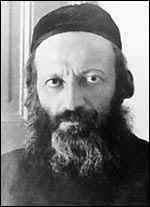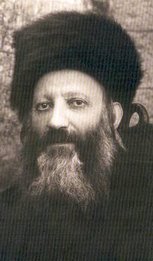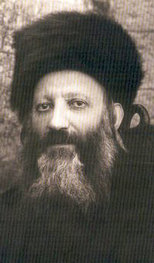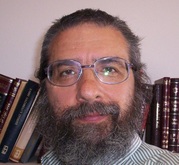|
A friend had the following dream about Rav Kook.
He was in shul next to a bar mitzvah boy who was about to go up to the Torah scroll for the weekly Torah reading of Lech Lecha. The boy said to him, "What question does Rav Kook have about this parshah?" My friend couldn't think of any. He said, "Rav Kook has questions dealing with all of the parshas and with all parts of the Torah. But his main question is: why is it that, although everything is filled with God's light, we don't see it?"
1 Comment
 by Rav Avraham Yitzchak Kook Love for people must be alive in the heart and in the soul: love for every individual and love for all nations—a desire for their elevation and their spiritual and material well-beingre-establishment. Hatred must exist only toward the evil and pollution in the world. It is absolutely impossible to attain the elevated spirit of “giving thanks to Hashem, calling out in His name, making His deeds known among the nations” (Psalms 105:1) without an inner love from the depths of the heart and spirit to do good for all the nations: to improve their acquisitions, to gladden their lives. This quality makes it possible for the spirit of the king messiah to impress itself upon the people of Israel. Wherever we find allusions to hatred, we know clearly that the intent is only toward evil, which strongly binds the union of many nations—at present and, even more, in ancient days, when the pollution of the world was more foul. But we must know that the core of life, light and holiness never moves away from the Divine image with which man overall is graced, and with which every nation and people is graced, each in accordance with its nature. And this holy kernel will elevate everything. From this point of life, we desire the total elevation that will occur in the world, the light of justice and righteousness united with splendor and harmony, with might and victory, and the perfection of all creation, starting with man and all of his extensions, and with the inner soul that lies in the depth of the awareness of the Congregation of Israel—which, when Hashem's spirit rests upon us, we proceed to arouse in physical and spiritual life. Midot Hara’ayah: Ahavah 5  by Rav Avraham Yitzchak Kook The structures of a person’s spirit suffer great destruction when the inner light of “a time to be silent” (Ecclesiastes 3:7) appears, when holy, supernal muteness in all of the splendor of its glory and the gravity of its burden fills his entire soul, yet he rebels against it and breaches it. That rebellion against the sovereignty of silence destroys all of its structures, all of the treasury of simplicity and uprightness, of profundity and supernal connection. All of that is shattered. If this person wishes to build its ruins, he must afterwards reestablish everything anew. At that time, the wise person will be silent. However, if a person gives silence its due when it first appears, it will perform its duty, establish its muteness, penetrate in its profundity and reach the perplexities of its depths, from which it will bring forth mighty foliage and branches with the power of great and fresh blossoming. The leaves will be filled with power and the expression of his lips will emerge. Then the “time to speak” (ibid.) will begin in its glorious majesty. A spirit of silence is the angel that acts upon the outpouring of speech, which will flow like streams, with great abundance and all beauty. “‘[I] create the speech of the lips. Peace, peace, to the distant and to the near,’ says Hashem, ‘and I will heal him’” (Isaiah 57:19). “Its fruit will be for food and its leaf for healing” (Ezekiel 47:12), “freeing the mouth of the mute” (j. Shekalim 6:1). Orot Hakodesh, Volume 3, p. 275  by Rav Avraham Yitzchak Kook Sometimes a person’s ideal visions cannot blossom and expand as they should because of a spiritual link between his will and his general guidance of the populace. Therefore, an inner need to separate himself completely from the entire popular avenue is born in him. But his distancing himself from the popular avenues and their spiritual nature causes him a natural weakness. This is common among people working in the spiritual field. And so they must augment their spiritual strength with the influence that they receive from the uncomplicated simplicity of the general populace, which follows its nature. Despite all of those people’s coarseness and darkened awareness, they possess many holy, sturdy inclinations, which can serve as great foundations for the spiritual stance of those whose minds are noble. Out of these two opposing judgments, the noble person must stand in the midst of two tendencies: to separate himself and to draw close. With this, he attains conceptual purity, on the one hand, and the natural strength that exists in simplicity and natural freshness, on the other. Orot Hakodesh, Volume 3, p. 272  Here's a tune that I put together for Succot. Tune: Jardin D'hiver, by Henri Salvador. Band: Karaoke track found on Youtube, fronted by the singer, me, utilizing Audacity and a webcam microphone. Words: From the written and oral Torahs. Chorus: "Rejoice on your holidays and be only joyful." Stanzas: 1) [The sinless people rejoicing in the Temple used to sing,} "Fortunate is our youth, for it has not caused us embarrassment in our old age." [And] "Fortunate is the person who never sinned, and fortunate is the person who, after having sinned, was forgiven." 2) [The penitents used to sing,] "Fortunate is our old age, in which we have gained atonement for our youth." [And] "Fortunate is the person who never sinned, and fortunate is the person who, after having sinned, was forgiven." Enjoy! |
Yaacov David Shulman
Archives
October 2019
Categories |

 RSS Feed
RSS Feed